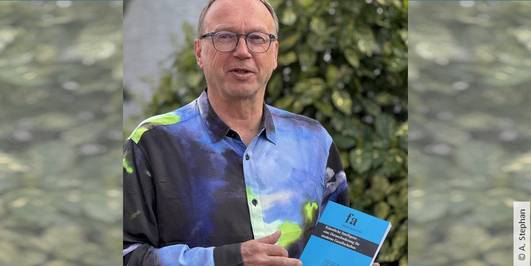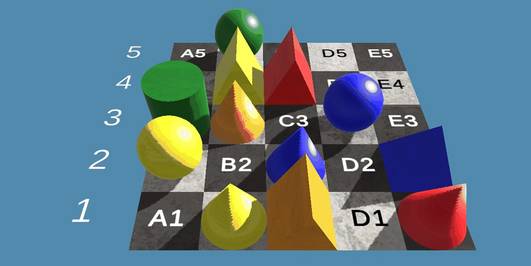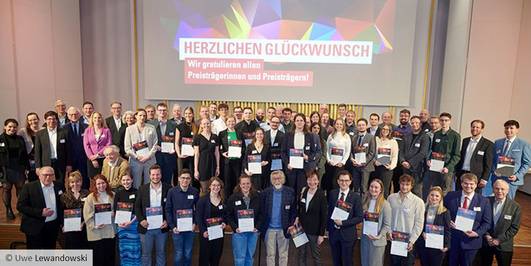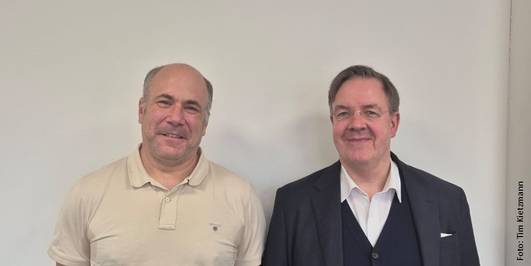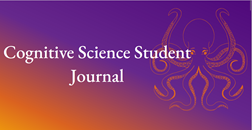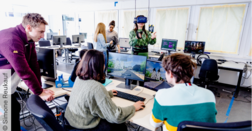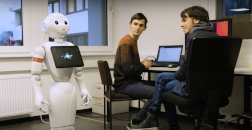Weiterführende Informationen
Top content
Mark Your Calendars: Alumni Conference 2025 is Coming!
We are thrilled to announce that our beloved Alumni Conference will take place on June 6th and 7th, 2025! Join us for a dynamic event filled with insightful talks and engaging conversations featuring former students from the Institute of Cognitive Science. One of the highlights will be a podium discussion exploring the pros and cons of pursuing a Ph.D.
This is a fantastic opportunity to discover future career paths and connect with fellow CogScis! At the heart of our conference, you will hear from former CogScis who have successfully built careers in research, industry, and NGOs. They will be available for Q&A sessions at the end of each day to address all your questions and provide valuable insights into their journeys.
Mark your calendars and get ready to reconnect, learn, and be inspired!
On the opportunities, risks and illusory worlds of AI - new publication from the Freie Akademie
The new 43rd volume of the Freie Akademie (FA) publication series invites its readers on a fascinating journey of discovery through the results and lectures of the scientific conference on “AI - a challenge for modern societies”, which took place in May 2024 and was chaired by osnabrück cognitive scientist Professor Dr. Achim Stephan. The book focuses on the many facets of artificial intelligence (AI), its historical development, the social inequalities it can generate, the interplay between AI and social media, new forms of (artificial) speech and the emergence of illusory worlds. Many of the contributors are active at the Institute of Cognitive Science or began their academic careers there, including Prof. Dr. Lena Kästner, who now holds the Chair of Philosophy, Computer Science and Artificial Intelligence at the University of Bayreuth.
Second place at the international Berkeley LLM Agent Hackathon
What a success! The team led by Julius Meyer and Prof. Dr. Elia Bruni took second place in the “Benchmarking” category at the international Berkeley LLM Agent Hackathon 2024. With their project iVISPAR, which analyzes the spatial reasoning capabilities of AI agents, they convinced the judges among 3,000 participants from 127 countries. For their success, they will receive compute credits worth 8,300 euros and an invitation to present their project in August 2025 in Berkeley, California.
Six outstanding theses honored
On March 6, a total of six cognitive science students were awarded the “Förderpreis der Universität Osnabrück” during the award ceremony at the Schloss.
The winners are:
Thomas Nortmann (Master's thesis, ROSEN Award)
Anne Dedert (Bachelor's thesis, ROSEN Sponsorship Award)
Dominik Brockmann (Bachelor's thesis, Intevation Award)
Lisa Golla (Bachelor's thesis, CogSci Network Award)
Wookyung Lee (Bachelor's thesis, CogSci Network Award)
Luu Zörlein (Master's thesis, CogSci Network Award)
Congratulations to all award winners!
Contract research for sleep data analysis
In March, a two-year research project on sleep data analysis will start in collaboration with the SomnoDiagnostics therapy center, led by PD Dr. med. Cornelius Bachmann, a renowned expert in sleep disorders and restless legs syndrome (RLS).
Together with Prof. Dr. Gordon Pipa, the influence of opioids on nocturnal respiratory parameters in RLS patients is being investigated. This topic has hardly been addressed in science to date, although the connection between nocturnal respiratory impairment and opioid use in pain therapy is well known. The study will be the first scientific investigation on this topic for RLS patients. Dr. Bachmann will also support the “Sleep and Dream” student initiative with his expertise.
IKW and Start-up Develop Language Learning Coach Based on Menstrual Cycle
The “LernZyklus” project, initiated by the Institute of Cognitive Science and Caona Health GmbH in February 2025, is financed with €130,000 from the Federal Ministry for Economic Affairs and Climate Action (BMWK). The goal is to design and test an AI-powered app that can provide hormonal cycle-based, personalized language learning plans and hence increase learning efficiency. The project is funded as part of the “Innovation Program for Business Models and Pioneering Solutions Initiative”.
The project is being carried out by Elisa Palme as a research assistant and Dr. Tobias Thelen as project manager. Together, they leverage their extensive expertise in artificial intelligence, psycholinguistics, and cognitive psychology to provide users of the app with personalized learning recommendations.
For Prospective Students:
Cognitive Science Student Journal
The Cognitive Science Student Journal publishes student works from all disciplines of Cognitive Science. In the Kaleidoscience Podcast students get a chance to talk about their own ideas and projects.
Bachelor Cognitive Science
This program is designed for you to explore the different fields within Cognitive Science, all while building a solid foundation in the core areas of Artificial Intelligence, Cognitive Modelling, Computational Linguistics, Neurobiology, Neuroinformatics, Neuroscience, Philosophy of Mind.
Master Cognitive Science
This Master Program allows you to refine your knowledge in Cognitive Psychology, Artificial Intelligence, Linguistics and Computational Linguistics, Neuroinformatics and Robotics, Neuroscience, and Philosophy of Mind and Cognition. You will build on your research skills through lab rotations, a year-long study project, and your master's thesis.
Master Cognitive Computing
The Cognitive Computing Program specializes in studying computational models of cognitive abilities. This course addresses working professionals who will continue to work in parallel to their studies. Graduates of this program are able to use their acquired skills for the development of innovative intelligent systems and services.


